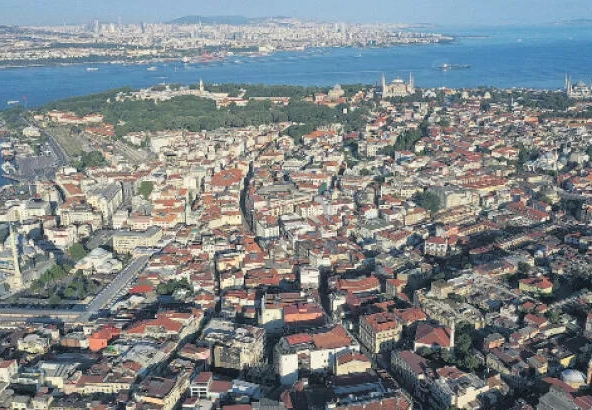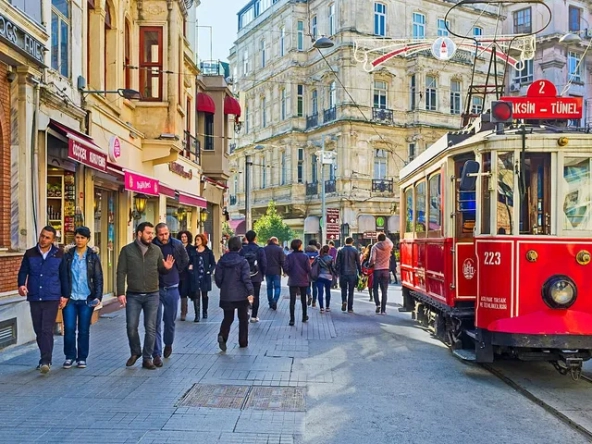KPMG Turkey has published the ‘Sectoral Overview 2021 – Real Estate Report’. According to the report; The real estate sector, which provides higher yields than interest, entered a recovery process in 2021, but the desired momentum has not yet been achieved because the balances have not settled. It was stated that the share of the construction sector in GDP increased to 5.8 percent in 2021, and that the number of residences within the scope of construction permits obtained in the first six months of 2021 reached the highest level of the last four years. KPMG Turkey Real Estate Sector Leader Özgür Sıvacı said, “Against the troublesome situations brought about by the restriction of movement, people turned to the summer houses in the holiday regions with the comfort of working from home. The prices increased at a record level here, too.” he evaluated
According to KPMG Turkey, ‘Sectoral Overview 2021 – Real Estate Report’; The economic stabilization and low interest policy pursued by Turkey led to an increase in the demand for housing. This brought the highest real price increase in Europe. While the concept of home, which has changed with the pandemic, has also had an impact on this increase, the accelerating city life has taken the fame of the summer houses away.
KPMG Turkey Real Estate Sector Leader Özgür Sıvacı, in his evaluation of the report; “The slowdown in economic activity with the pandemic also affected the demand of households for real estate investments. The new normalization process, which started in 2021, paved the way for recovery in the sector. However, there are too many variables and the balances are not settled yet,” he said. Sıvacı pointed out that today, in classical economic cycles, the housing sector provides a higher return than the interest rate and said, “A strong recovery process has been started in 2021, but since the balances have not settled, it supports the cautiously optimistic stance on the demand side. Despite the cautious outlook in demand conditions, the upward trend in global housing prices continues. In addition, the inevitable change in the business world and the new business models adopted led to a disruption in the industry. The sector is trying to settle the balances and keep up with this renewal process,” he said.
“EUROPE’S HIGHEST REAL PRICE INCREASE”
Sıvacı said, “Countries have implemented different monetary and fiscal policies in order to prevent major economic collapses during the epidemic. These differences stand out as the main reason for the differences between countries. For example, in our country, the credit-supported economic stabilization policy and the accompanying extremely low loan rates significantly increased the housing demand in 2020, resulting in a real price increase of more than 13 percent. Price increases are observed in real terms in 49 of the 63 countries that are subject to the IMF’s research. When we analyze the annual price change with the more up-to-date Eurostat data, Turkey was the country where the housing prices increased the most, with an increase of 32 percent in the last year.
The change in expectations and living conditions, especially in the pandemic, is at the forefront of the record increase in prices. It can be stated that while the demand for high square meters, detached houses and low-rise residential areas increases, urban transformation keeps the demand alive for rent. While rising costs decreased new housing production, the rise in input costs and loan interests was also reflected in prices. In the new period, it is expected that there will be a decrease in the rate of price increase with the effect of the increase in housing supply. A similar decrease can be seen in the rate of rent increase with the decrease in urban transformation applications and demand in the winter months.
“PEOPLE GO TO HOLIDAYS IN HOLIDAY AREAS”
The number of completed houses between the said dates was higher than the number of houses started. Demand for construction permits has revived since this year as the license stock started to melt. According to the building permit statistics published by TURKSTAT, in the first six months of 2021, the number of buildings increased by 88.4 percent, the surface area increased by 45.3 percent, the value of the buildings increased by 93.7 percent, and the number of flats increased by 49.8 percent compared to the same period of the previous year. made a statement.
“ENGINE OF GROWTH CAN RETURN”
Sıvacı said, “The Turkish construction sector is among the leading sectors in terms of its share in GDP. The fragility experienced for several years in the sector, which has become the “growth engine” with its share exceeding 8 percent from time to time, causes this share to decrease. The sector, which received an average of 7 percent share from Turkey, closed 2020 with a 5 percent share. With the first quarter of 2021, the share of the sector, which recovered its contraction in the pandemic process, has reached 5.8 percent. he evaluated
Here are some highlights of the report;
– In the first six months of 2021, the number of residences under construction permits is at the highest level in the last four years. Considering this interest in licenses, it can be stated that there may be an increase in new construction in housing in the coming period. In the first six months of 2021, the total surface area of the buildings for which the building permit was given was 65.4 million m2, of which 38.5 million m2 was residential, 14.4 million m2 was non-residential and 12.5 million m2 was common use area. .
– The construction cost index reveals the cost increase experienced in the sector in this process. The indicator, which has risen for fifteen months excluding one month before June 2021, is at the level of 42.5 percent as of now. The annual rate of increase in the index was 5.8 percent in May 2020. This increase in costs in the sector naturally manifests itself in prices as well. The annual rate of increase in the housing price index, which increased by 2.7 percent for one month in June 2021, is 29.2 percent. When this value is adjusted for inflation, the real increase is measured as 9.9 percent.
– The view observed in 2020 on the sales side is not valid for 2021. In the environment supported by low loan interest rates, there is a rapid withdrawal in sales, which has seen historical peaks. If we look at the data on an annual basis, not on a monthly basis; In the first seven months of 2021, it is seen that housing sales contracted by 23 percent. The main reason for this movement is that mortgaged, that is, loaned housing sales decreased by 69 percent in the same period.
– The expansion of credit facilities led to the fact that almost half of the sales were made through housing loans in the first seven months of 2020. This rate is 19 percent for 2021.
– In this process, the depreciation of TL has also led to an increase in the real estate purchases of non-residents in our country. While 2 percent of the real estates sold in the first seven months of 2020 were purchased by foreigners, the same rate has increased to 3.8 percent this year.
– Seasonally adjusted construction confidence index increased by 4.7 percent in July to 86.3. Although the threshold value in the index is 100 and below this value indicates a negative outlook, the recovery trend can be evaluated as positive.
– As of the first quarter of 2021, 13.6 million square meters of space is offered in 447 shopping malls in our country. The supply in the market, which tripled in terms of number of shopping malls and square meter supply in the 2007-2017 period, continues its horizontal course with both the saturation of the market and other related results. Istanbul continues to be the center of the shopping mall market, which hosts more than one third of the total volume.
– According to the data of the European Statistics Office (Eurostat), Turkey was the country where the housing prices increased the most, with an increase of 32 percent in the last year. In the European Union, an increase of 6.1 percent was recorded in the first period of 2021 compared to the same period of the previous year, while the countries with the highest increase in housing prices after Turkey were Luxembourg with 17 percent, Denmark with 15.3 percent and Lithuania with 12 percent. it happened.
– As in housing prices, Turkey is the country with the highest rental price increase among EU countries. According to Eurostat’s data, between 2020 and 2021, rents in Turkey increased by 9.4 percent. Austria follows Turkey with an increase of 5 percent and Latvia with an increase of 4.1 percent. Rental prices in Turkey increased mostly in big cities.




